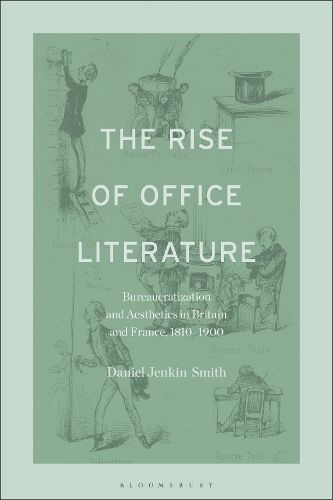Readings Newsletter
Become a Readings Member to make your shopping experience even easier.
Sign in or sign up for free!
You’re not far away from qualifying for FREE standard shipping within Australia
You’ve qualified for FREE standard shipping within Australia
The cart is loading…






Explores the social and cultural history of bureaucratization in 19th-century Britain and France via the evolving literary portrayal of office life.
Literary critics have long cited the clerk in 19th-century literature as an emblem of a nascent lower middle class, or of shifting gender roles in the world of work. Moreover, there is growing critical interest in the influence of rapidly evolving organizational systems and data networks on this period's culture. By refocusing on the point at which these interests meet - the office - The Rise of Office Literature plays a synthesizing role, identifying this workplace as a point of convergence between the abstract and the quotidian, between structures and workers.
By exploring the history of 'office literature' - a 'forgotten' nineteenth-century literary genre whose exemplars focus primarily on office life - Daniel Jenkin-Smith argues that the portrayal of new labour practices, intellectual forms and bureaucratic technologies in English and French literature served to problematize existing narrative conventions, while also enabling new developments in literary aesthetics. Office literature's unique position - between the ongoing process of nineteenth-century bureaucratization and the rapidly evolving realist and satirical traditions of this period's literature - means that it offers an especially insightful perspective onto the interrelation of aesthetic, intellectual, economic and social history.
$9.00 standard shipping within Australia
FREE standard shipping within Australia for orders over $100.00
Express & International shipping calculated at checkout
Explores the social and cultural history of bureaucratization in 19th-century Britain and France via the evolving literary portrayal of office life.
Literary critics have long cited the clerk in 19th-century literature as an emblem of a nascent lower middle class, or of shifting gender roles in the world of work. Moreover, there is growing critical interest in the influence of rapidly evolving organizational systems and data networks on this period's culture. By refocusing on the point at which these interests meet - the office - The Rise of Office Literature plays a synthesizing role, identifying this workplace as a point of convergence between the abstract and the quotidian, between structures and workers.
By exploring the history of 'office literature' - a 'forgotten' nineteenth-century literary genre whose exemplars focus primarily on office life - Daniel Jenkin-Smith argues that the portrayal of new labour practices, intellectual forms and bureaucratic technologies in English and French literature served to problematize existing narrative conventions, while also enabling new developments in literary aesthetics. Office literature's unique position - between the ongoing process of nineteenth-century bureaucratization and the rapidly evolving realist and satirical traditions of this period's literature - means that it offers an especially insightful perspective onto the interrelation of aesthetic, intellectual, economic and social history.